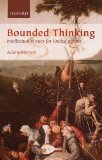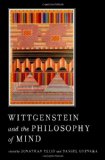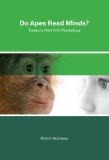December 30, 2012

Bounded Thinking: Intellectual virtues for Limited Agents by Adam Morton (Oxford University Press, USA, 2012)
(amazon.co.uk)
Book description from the publisher:
Bounded Thinking offers a new account of the virtues of limitation management: intellectual virtues of adapting to the fact that we cannot solve many problems that we can easily describe. Adam Morton argues that we do give one another guidance on managing our limitations, but that this has to be in terms of virtues and not of rules, and in terms of success–knowledge and accomplishment–rather than rationality. He establishes a taxonomy of intellectual virtues, which includes ‘paradoxical virtues’ that sound like vices, such as the virtue of ignoring evidence and the virtue of not thinking too hard. There are also virtues of not planning ahead, in that some forms of such planning require present knowledge of one’s future knowledge that is arguably impossible. A person’s best response to many problems depends not on the most rationally promising solution to solving them but on the most likely route to success given the profile of intellectual virtues that the person has and lacks. Morton illustrates his argument with discussions of several paradoxes and conundra. He closes the book with a discussion of intelligence and rationality, and argues that both have very limited usefulness in the evaluation of who will make progress on which problems.
Google Books preview:
Comments (0)
- new books,philosophy of mind
September 14, 2012

Wittgenstein and the Philosophy of Mind, ed. by Jonathan Ellis and Daniel Guevara (Oxford University Press, 2012)
(amazon.co.uk – Oct 2012)
Product description from the publisher:
Philosophical questions about the mind preoccupied much of Wittgenstein’s later writing, and his contribution to them is deep and wide-ranging, bearing upon philosophical issues concerning sense-experience, concept formation, perception, introspection, the science of psychology, aspect perception, the self, the understanding of rules, the relation between mind and brain, artificial intelligence, and many other subjects of current concern. According to a growing number of eminent philosophers, however, many of Wittgenstein’s most important insights have still not been properly absorbed by contemporary philosophical debates on these topics. If anything, work on these subjects is less informed by Wittgenstein’s examples and discussions than ever before. In this volume, philosophers from inside and outside of Wittgensteinian circles explore Wittgenstein’s treatment of philosophical questions about the mind and issues in contemporary philosophy of mind upon which Wittgenstein’s philosophy may have significance. Bringing to bear their broad range of perspectives on his philosophy, these philosophers collectively demonstrate its fundamental import for present-day philosophy of mind.
Google Books preview:
See also: Jonathan Ellis’s webpage
Comments (0)
- new books,philosophy of mind
September 3, 2012

Mind and Cosmos: Why the Materialist Neo-Darwinian Conception of Nature is Almost Certainly False by Thomas Nagel (Oxford University Press)
(kindle ed.), (amazon.co.uk – Nov 2012)
Book description from the publisher:
The modern materialist approach to life has conspicuously failed to explain such central mind-related features of our world as consciousness, intentionality, meaning, and value. This failure to account for something so integral to nature as mind, argues philosopher Thomas Nagel, is a major problem, threatening to unravel the entire naturalistic world picture, extending to biology, evolutionary theory, and cosmology.
Since minds are features of biological systems that have developed through evolution, the standard materialist version of evolutionary biology is fundamentally incomplete. And the cosmological history that led to the origin of life and the coming into existence of the conditions for evolution cannot be a merely materialist history, either. An adequate conception of nature would have to explain the appearance in the universe of materially irreducible conscious minds, as such.
Nagel’s skepticism is not based on religious belief or on a belief in any definite alternative. In Mind and Cosmos, he does suggest that if the materialist account is wrong, then principles of a different kind may also be at work in the history of nature, principles of the growth of order that are in their logical form teleological rather than mechanistic.
In spite of the great achievements of the physical sciences, reductive materialism is a world view ripe for displacement. Nagel shows that to recognize its limits is the first step in looking for alternatives, or at least in being open to their possibility.
Google Books preview:
See also: Thomas Nagel at Wikipedia
Comments (1)
- consciousness,philosophy of mind,reality
July 29, 2012

Do Apes Read Minds?: Toward a New Folk Psychology by Kristin Andrews (MIT Press, 2012)
(amazon.co.uk)
Book description from the publisher:
By adulthood, most of us have become experts in human behavior, able to make sense of the myriad behaviors we find in environments ranging from the family home to the local mall and beyond. In philosophy of mind, our understanding of others has been largely explained in terms of knowing others’ beliefs and desires; describing others’ behavior in these terms is the core of what is known as folk psychology. In Do Apes Read Minds? Kristin Andrews challenges this view of folk psychology, arguing that we don’t consider others’ beliefs and desires when predicting most quotidian behavior, and that our explanations in these terms are often inaccurate or unhelpful. Rather than mindreading, or understanding others as receptacles for propositional attitudes, Andrews claims that folk psychologists see others first as whole persons with traits, emotions, and social relations. Drawing on research in developmental psychology, social psychology, and animal cognition, Andrews argues for a pluralistic folk psychology that employs different kinds of practices (including prediction, explanation, and justification) and different kinds of cognitive tools (including personality trait attribution, stereotype activation, inductive reasoning about past behavior, and generalization from self) that are involved in our folk psychological practices. According to this understanding of folk psychology–which does not require the sophisticated cognitive machinery of second-order metacognition associated with having a theory of mind–animals (including the other great apes) may be folk psychologists, too.
Google Books preview:
See also: Kristin Andrews and Robert Lurz on animals and mindreading at Philosophy TV, author’s articles at PhilPapers
Comments (0)
- cognitive science,new books,philosophy of mind
April 11, 2012

Brains, Buddhas, and Believing: The Problem of Intentionality in Classical Buddhist and Cognitive-Scientific Philosophy of Mind by Dan Arnold (Columbia University Press, 2012)
(amazon.co.uk – 1 May 2012)
Book description from the publisher:
In the recent, burgeoning discourse on Buddhist thought and cognitive science, premodern Buddhists are sometimes characterized as veritable “mind scientists” whose insights anticipate modern research on the brain and mind. Aiming to complicate this story, Dan Arnold confronts a significant obstacle to popular attempts at harmonizing classical Buddhist and modern scientific thought: since most Indian Buddhists believe that the mental continuum is uninterrupted by death (its continuity is what Buddhists mean by “rebirth”), they would have no truck with claims that everything about the mental is explicable with reference to brain events. Yet despite this significant divergence, a predominant stream of Indian Buddhist thought, associated with the seventh-century thinker Dharmakirti, turns out to be vulnerable to arguments modern philosophers have leveled against physicalism.
By characterizing the philosophical problems commonly faced by Dharmakirti and contemporary philosophers such as Jerry Fodor and Daniel Dennett, Arnold seeks to advance an understanding of both first-millennium Indian arguments and contemporary debates in philosophy of mind. The issues center on what modern philosophers have called intentionality — the fact that the mind can be about (or represent or mean) other things. Tracing an account of intentionality through Kant, Wilfrid Sellars, and John McDowell, Arnold argues that intentionality cannot, in principle, be explained in causal terms. Elaborating some of Dharmakirti’s central commitments (chiefly his apoha theory of meaning and his account of self-awareness), Arnold shows that despite Dharmakirti’s interest in refuting physicalism, his causal explanations of the mental mean that modern arguments from intentionality cut as much against his project as they do against physicalist philosophies of mind. This is evident in the arguments of some of Dharmakirti’s contemporaneous Indian critics (proponents of the orthodox Brahmanical Mimamsa school as well as fellow Buddhists from the Madhyamaka school of thought), whose critiques exemplify the same logic as modern arguments from intentionality. Arnold’s complex study shows that seemingly arcane arguments among first-millennium Indian thinkers illuminate matters still very much at issue among contemporary philosophers.
Comments (0)
- cognitive science,consciousness,new books,philosophy of mind







